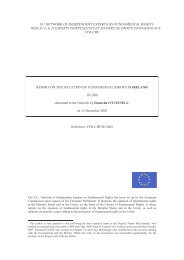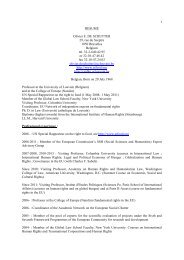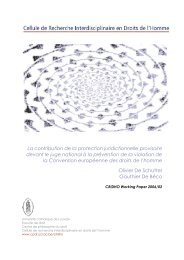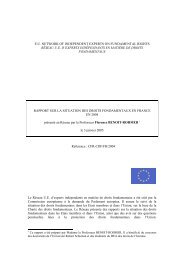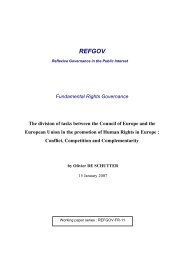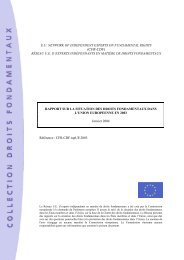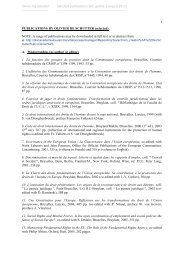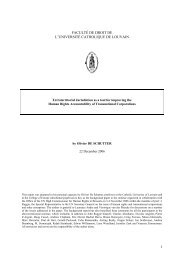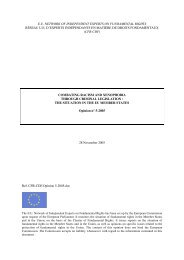The Prohibition of Discrimination under European Human ... - cridho
The Prohibition of Discrimination under European Human ... - cridho
The Prohibition of Discrimination under European Human ... - cridho
You also want an ePaper? Increase the reach of your titles
YUMPU automatically turns print PDFs into web optimized ePapers that Google loves.
thematic report<br />
■ THE PROHIBITION OF DISCRIMINATION UNDER EUROPEAN HUMAN RIGHTS LAW ■<br />
prohibited discrimination, either direct or indirect, 121 where homosexual couples are denied advantages reserved<br />
to married couples, just like non-married heterosexual couples are denied those advantaged, although only<br />
homosexuals have not choice to marry ?<br />
<strong>The</strong> case-law <strong>of</strong> the <strong>European</strong> Court <strong>of</strong> <strong>Human</strong> Rights is not favourable to such reasoning. In a case where a woman<br />
who had cohabited during 17 years with a man who died in an industrial accident, had been denied the<br />
advantages she would have been recognized if she had been a widow despite the fact that her companion had<br />
contributed to the relevant fund during his lifetime. <strong>The</strong> <strong>European</strong> Court <strong>of</strong> <strong>Human</strong> Rights stated that although «<br />
there may well now be an increased social acceptance <strong>of</strong> stable personal relationships outside the traditional<br />
notion <strong>of</strong> marriage, (…) marriage remains an institution which is widely accepted as conferring a particular status<br />
on those who enter it. <strong>The</strong> situation <strong>of</strong> the applicant is therefore not comparable to that <strong>of</strong> a widow ». 122 Recalling<br />
its case-law according to which the promotion <strong>of</strong> the traditional concept <strong>of</strong> family constitutes a legitimate aim<br />
which a State Party to the ECHR may pursue, 123 the Court noted that « marriage remains an institution that is<br />
widely accepted as conferring a particular status on those who enter it and, indeed, it is singled out for special<br />
treatment <strong>under</strong> Article 12 <strong>of</strong> the Convention ». It concluded that « the promotion <strong>of</strong> marriage, by way <strong>of</strong> limited<br />
benefits for surviving spouses, cannot be said to exceed the margin <strong>of</strong> appreciation afforded to the respondent<br />
government ».<br />
Although this case-law concerns a situation where the applicant had the choice whether or not to marry her life<br />
companion, and chose deliberately to remain outside the institution <strong>of</strong> marriage although this institution was<br />
accessible to the couple, thus leaving open, then, the question whether such conclusion would also apply where a<br />
homosexual couple – to whom the institution <strong>of</strong> marriage is closed – would be deprived <strong>of</strong> certain advantages<br />
reserved to married couples, the later case-law <strong>of</strong> the <strong>European</strong> Court <strong>of</strong> <strong>Human</strong> Rights simply transposed the<br />
same solution to this arguably different context. In the case <strong>of</strong> Mata Estevez v. Spain, the applicant complained <strong>of</strong><br />
the difference <strong>of</strong> treatment regarding eligibility for a survivor’s pension between de facto homosexual partners<br />
and married couples, or even unmarried heterosexual couples who, if legally unable to marry before the divorce<br />
laws were passed in 1981, are eligible for a survivor’s pension. 124 He submitted that such difference in treatment<br />
amounted to unjustified discrimination which infringed his right to respect for his private and family life.<strong>The</strong> Court<br />
however considered that application inadmissible, noting that the Spanish legislation relating to eligibility for<br />
survivors’ allowances « does have a legitimate aim, which is the protection <strong>of</strong> the family based on marriage bonds »<br />
and that, therefore, « the difference in treatment found can be considered to fall within the State’s margin <strong>of</strong><br />
appreciation ».<br />
This inadmissibility decision, very poorly reasoned on the specific issue discussed in the present report, implies<br />
that an interpretation <strong>of</strong> the Framework Directive which would not condemn reserving advantages to married<br />
121<br />
122<br />
123<br />
124<br />
It could be argued that the prohibition <strong>of</strong> indirect discrimination is a prohibition not to treat differently situations which call for a differential<br />
treatment, as the <strong>European</strong> Court <strong>of</strong> <strong>Human</strong> Rights and the <strong>European</strong> Committee <strong>of</strong> Social Rights have done in Thlimmenos and Autisme-<br />
Europe respectively. Under this reasoning, homosexal couples are in a situation different than heterosexual couples, because only the former,<br />
having no access to marriage, have not chosen not to marry. Alternatively, this situation could be described as an instance <strong>of</strong> direct<br />
discrimination on the basis <strong>of</strong> the reasoning that, justs like difference <strong>of</strong> treatment based on pregnancy as a form <strong>of</strong> direct discrimination<br />
based on sex, because only women – not men – may become pregnant (see Case C-177/88, Dekker [1990] ECR I-3941, Recital 12 (judgment <strong>of</strong><br />
8 November 1990)), an advantage recognized to married couples is direct discrimination based on sexual orientation, because only<br />
homosexuals cannot marry.<br />
Eur. Ct. HR, Shackell v. the United Kingdom (Appl. N° 45851/99), decision <strong>of</strong> 27 April 2000 (inadmissibility for manifest ill-foundness <strong>of</strong> the<br />
application).<br />
See Eur. Ct. HR, Mazurek v. France (Appl. N° 34406/97), § 50; Eur. Ct. HR, F v. Switzerland, judgment <strong>of</strong> 18 December 1987, Series A n°128, § 36.<br />
Eur. Ct. HR (4th sect.), Mata Estevez v. Spain (Appl. N° 56501/00), dec. (inadmissibility) <strong>of</strong> 10 May 2001, Rep. 2001-VI.<br />
44



